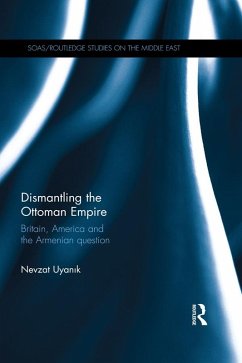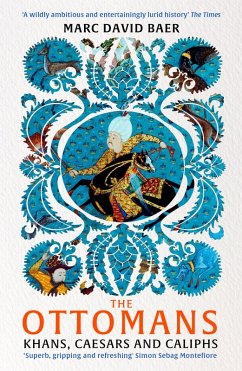
The Deys and Beys of Tunis, 1666-1922 (eBook, ePUB)
From Military Power to the Monarchy
Übersetzer: Thompson, Laura; Fitoussi, Margaux
Versandkostenfrei!
Erscheint vor. 14.04.26
42,95 €
inkl. MwSt.
Unser Service für Vorbesteller - dein Vorteil ohne Risiko:
Sollten wir den Preis dieses Artikels vor dem Erscheinungsdatum senken, werden wir dir den Artikel bei der Auslieferung automatisch zum günstigeren Preis berechnen.
Weitere Ausgaben:

PAYBACK Punkte
21 °P sammeln!
A foundational text on the early modern history of Tunis that places Tunisian history firmly within Ottoman historyThe Tunisian historiography of the modern era has broadly centered on a narrative of three successive powers: the pashas, first, followed by the deys (the "symbolic uncles" of the Turkish militia), who were in turn deposed by the beys (native civil rulers arising out of Hafsid times). This approach has provided all the components of a national narrative: it has posited the decline of the pasha's authority as a consequence of the Tunisian province's autonomy, and has framed the war...
A foundational text on the early modern history of Tunis that places Tunisian history firmly within Ottoman history
The Tunisian historiography of the modern era has broadly centered on a narrative of three successive powers: the pashas, first, followed by the deys (the "symbolic uncles" of the Turkish militia), who were in turn deposed by the beys (native civil rulers arising out of Hafsid times). This approach has provided all the components of a national narrative: it has posited the decline of the pasha's authority as a consequence of the Tunisian province's autonomy, and has framed the wars between deys and beys as a conflict of identity between the Turks and the locals.
While this linear story is seductive in its apparent coherence, it leaves several questions in the shadows, in particular, the interference of several external forces in the affairs of the province: most notably, the Ottoman Empire. The Regency of Tunis was effectively controlled by the Ottomans who had reactivated a former Hafsid institution, the mhalla. A kind of itinerant power, the mhalla succeeded in allowing the Ottomans to establish peace through the creation of tax regulations and matrimonial alliances with the tribes. Thus, the Regency of Tunis was able to distinguish itself from other imperial provinces through the founding of a monarchical house symbolically linked to the Empire and, at the same time, socially anchored in its territory.
Relying on local sources in Tunisian archives, Leïla Blili places the Regency of Tunis firmly within the Ottoman Empire, revealing the complex connections between the imperial center and its far-flung province, and challenging the long-standing theory of Tunisian autonomy. Blili's examination of social continuity during moments of intense political turbulence restores the place of women in the narrative of state formation, underlining the significance of the matrimonial politics of sovereigns and the crucial political and social roles women played in the regency.
The Tunisian historiography of the modern era has broadly centered on a narrative of three successive powers: the pashas, first, followed by the deys (the "symbolic uncles" of the Turkish militia), who were in turn deposed by the beys (native civil rulers arising out of Hafsid times). This approach has provided all the components of a national narrative: it has posited the decline of the pasha's authority as a consequence of the Tunisian province's autonomy, and has framed the wars between deys and beys as a conflict of identity between the Turks and the locals.
While this linear story is seductive in its apparent coherence, it leaves several questions in the shadows, in particular, the interference of several external forces in the affairs of the province: most notably, the Ottoman Empire. The Regency of Tunis was effectively controlled by the Ottomans who had reactivated a former Hafsid institution, the mhalla. A kind of itinerant power, the mhalla succeeded in allowing the Ottomans to establish peace through the creation of tax regulations and matrimonial alliances with the tribes. Thus, the Regency of Tunis was able to distinguish itself from other imperial provinces through the founding of a monarchical house symbolically linked to the Empire and, at the same time, socially anchored in its territory.
Relying on local sources in Tunisian archives, Leïla Blili places the Regency of Tunis firmly within the Ottoman Empire, revealing the complex connections between the imperial center and its far-flung province, and challenging the long-standing theory of Tunisian autonomy. Blili's examination of social continuity during moments of intense political turbulence restores the place of women in the narrative of state formation, underlining the significance of the matrimonial politics of sovereigns and the crucial political and social roles women played in the regency.
Dieser Download kann aus rechtlichen Gründen nur mit Rechnungsadresse in A, D ausgeliefert werden.












